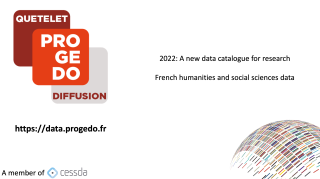Past events
This free half-day online workshop will give background information needed to work with the Labour Force Survey (LFS) and Annual Population Survey (APS) in research.
Secondary analysis is a great way to get experience working with data without having to go into the field. This free workshop, organised by the UK Data Service, will take you through the research process of a secondary analysis project, which includes an overview of the methodological, ethical, and procedural issues.
We are pleased to announce that the IASSIST 2021 Global Virtual Conference (GVC) will be held on 18-20 May 2021. Workshops will be held the week prior.
This free workshop, organised by the UK Data Service, is an introduction to computational social science. It offers attendees a chance to understand and discuss what computational social science is, what it is good for, how to become a computational social scientist and what are the basic steps to follow in and ideal computational social science research project.
PRE-CONFERENCE WORKSHOP - SSHOC Open Science and Research Data Management Train-the-Trainer Bootcamp
The bootcamp aims to aid trainers in finding resources and tools they can re-use in their training activities. The Bootcamp will consist of two two-hour sessions held on two separate days with time in between for participants to work on assignments.
Three workshops from the Croatian Social Science Data Archive: "Data sharing and discovery at CROSSDA and CESSDA", "Introduction to anonymising quantitative data", and "Data cleaning operations using the R language".
This is a webinar designed to give participants a virtual tour of ReShare, where you will learn everything you need to know in order to archive data using our self-deposit repository.
In this webinar, Metadata Technology North America will provide an overview of Rich Data Services (https://www.richdataservices.com), an API based solution to concurrently deliver data and metadata as a service.
In this webinar, frequently asked questions in relation to data industries will be discussed.
Participants will learn about the key issues to consider when using secondary data analysis as a method. The introductory session will briefly cover the pros and cons of reusing data and the importance of learning about the origins of your data. Quantitative and qualitative secondary analysis will be discussed with examples and issues of context, sampling and ethics raised.

